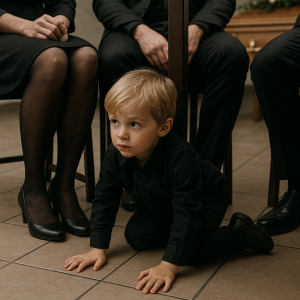They Told Me to Wash Dishes at the Gala — Not Realizing the Mansion Was Mine
My name is Tessa Cross. And two hours ago, I was elbow-deep in a sink full of suds, scrubbing plates in my own kitchen. The sting of hot water had already reddened my hands, a tower of dirty glasses balanced precariously beside me, and the ache in my feet pulsed with every step I took on the tiled floor. My hair was knotted into a bun, my face bare, not a hint of makeup left, and the apron tied around my waist marked me as staff, not as a host.
What made the situation surreal was that just a few floors above me, inside the glittering ballroom of our mansion, the annual Cross Foundation Gala was unfolding. Hundreds of men and women dressed in sequins and tuxedos swirled across the polished marble. Champagne flutes clinked beneath the dazzling light of chandeliers. A wall of roses and orchids, arranged meticulously to spell “The Cross Foundation,” became the backdrop for endless photographs.
It was my home. My event. My creation.
And yet, I was invisible.
Because I chose to be.
That night, instead of slipping into an evening gown and diamonds, I borrowed a black catering uniform—slacks, a plain polo, and an apron. I quietly disappeared into the bustle of the kitchen before the first guest arrived, blending in with the staff who rushed around balancing trays and polishing silverware.

Why would I do such a thing?
Because for weeks, Nathan—my husband—had been telling me stories about the double lives people lived in his social circle. Men who shook his hand and congratulated him, then whispered behind his back. Women who posted about generosity online, yet scoffed at anyone who couldn’t afford designer shoes. “Most of them aren’t here for the cause,” he’d told me. “They’re here to be seen.”
I wanted to know if he was right.
And so, I stepped into the shoes of someone they considered beneath them. I wanted to see their true selves—the versions that only came out when they thought nobody of consequence was watching.
It didn’t take long.
The first sting came from a woman in a crimson satin gown. She snapped her fingers when I failed to produce the exact bottle of wine she requested within seconds.
“You people need proper training,” she muttered, not even looking at me.
You people.
The phrase lodged itself in my chest, heavy and sharp.
Later, the event planner we’d hired—Sasha, a woman whose invoices read like ransom notes—stormed into the kitchen, her headset dangling from her ear. She pointed at me with a manicured finger.
“Hey! Apron girl! Table six is still waiting on water. Why are you standing around?”
I bit back the words rising in my throat and obeyed. When I carried the pitcher out, weaving between tables, I felt the sting of whispers trailing me. Some guests glanced over me, then dismissed me entirely, as if I were wallpaper. Others smiled politely, but only in the way one acknowledges an object doing its job.
Near the dessert table, Eleanor—an aging socialite with a pearl necklace worth more than most houses—waved me over.
“You’re too slow with the shrimp,” she complained. “Didn’t anyone teach you coordination? And really, dear, you should smile more. Service staff look dreadful when they sulk.”
So I smiled.
“That’s better. Actually—no, never mind. Go help with the dishes. You seem better suited for that.”
The irony nearly made me laugh.
Dishes. In my own kitchen. A few steps away from the staircase where my wedding portrait with Nathan hung in a gilded frame. Past the hallway where his anniversary gift to me—a painting I adored—decorated the wall.
Still, I nodded like an obedient worker and retreated to the kitchen. And there I stayed, scrubbing, stacking, drying. While above me, music and laughter floated down through the vents—a cruel reminder of the world I was supposed to inhabit.
I hadn’t expected kindness, but the coldness shook me. These were people who spoke eloquently about compassion in front of cameras, then turned into royalty when faced with someone they considered beneath them. The gala no longer felt like a celebration of generosity—it felt like a performance staged for status.
I was finishing the last plate when I heard it.
“Excuse me… has anyone seen my wife?”
The voice stopped me cold.
Nathan.
It carried through the ballroom with casual volume, but underneath was an unmistakable edge.
“She was supposed to meet me near the dessert table,” he continued, his tone slightly sharper now. “It’s been twenty minutes.”
I peeked out just in time to see him step into the center of the room, tuxedo crisp, glass of champagne in hand. Conversations slowed. Faces turned.
Sasha scurried forward. “I—I haven’t seen her, Mr. Cross.”
Eleanor chimed in with a dismissive laugh. “Perhaps she got caught up. You know how wives can be.”
Nathan smiled tightly. “Perhaps. Though I suspect she may be… downstairs. Helping with the dishes.”
The room stilled.
You could hear the chandeliers buzzing.
And then his eyes found me.
Standing at the kitchen entrance in catering clothes, cheeks flushed from steam, hands dripping with soap.
He smiled.
“There she is.”
Every head turned as Nathan crossed to me, untied the apron at my waist, and gently dried my damp hands with his pocket square. Then, without hesitation, he kissed my forehead.
“Ladies and gentlemen,” he said, raising his voice just enough, “this is my wife, Tessa. The woman this gala was dedicated to. The woman who helped me build this home, this life, and the very foundation you are supporting tonight.”
Silence.
You could’ve dropped a pin and heard it bounce.
Faces drained of color. Eleanor’s lips parted. Sasha froze, her headset sliding down her shoulder.
“She was… in the kitchen?” someone whispered.
“She was… washing dishes?”
Nathan’s expression didn’t waver.
“Yes. She decided to see tonight from the staff’s perspective. I didn’t know she would, but I think it’s brilliant. And based on what I’ve heard, not everyone passed her test.”
A ripple of discomfort spread. Guests shifted in their seats. A few avoided eye contact entirely. Sasha excused herself, red-faced. Eleanor clutched her pearls tighter.
Nathan took my hand and led me to the stage.
“I want to say this clearly,” he announced. “Outfit or not, Tessa has always been the most important woman in this room. If anyone treated her otherwise tonight… perhaps you should question whether you understand the meaning of charity at all.”
It wasn’t anger. It wasn’t a lecture.
It was truth. Raw and undeniable.
And for once, the room listened.
Hours later, when the chandeliers dimmed and the last guest slipped away, Nathan and I sat together on the back patio. The mansion glowed softly behind us, and the stars stretched endlessly overhead.
“I’m sorry,” he said, his hand wrapped around mine. “I didn’t realize it would be so cruel.”
“I needed to see it,” I whispered. “Not for you—for me. I had to remind myself why kindness matters more than diamonds or titles.”
He pressed a kiss to my hand. We stayed in silence, letting the night breathe around us.
By morning, the story had already spread. Someone had recorded Nathan’s words, and the clip had gone viral. My phone buzzed with messages—some from guests, offering apologies, others from strangers applauding the lesson. Donations to the foundation doubled overnight.
Sasha resigned the following week. Rumor had it she was starting a bakery, hoping to “learn humility.”
Eleanor sent flowers. Twice.
As for me? I kept the apron. It hangs in my closet beside gowns worth fortunes.
A reminder that once, the wealthiest woman in the room was the one scrubbing dishes—and taking notes.
Read more:
- My husband took every penny from our daughter’s college fund and walked away with someone new
- A New Mom Rushed Home to Surprise Her Husband After Giving Birth — What She Found in Their Bedroom Left Her Screaming.
- My son approached a stranger in uniform at the diner—and his seven words silenced the room.









